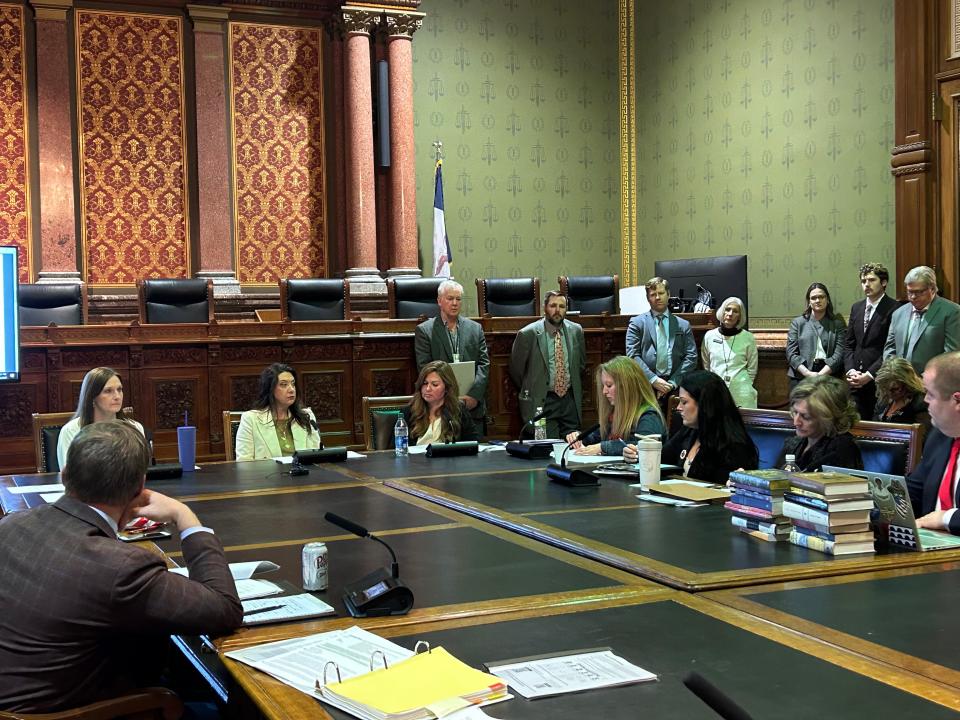Iowa is on the verge of banning school books with sex acts. Which books could be affected?
Editor's Note: This story contains sexually explicit language from Iowa law that may offend some readers.
In less than a year, Iowa schools would be required to remove any book describing or visually depicting a sex act under a new bill passed by the Iowa Legislature.
Although the bill hasn't yet been signed into law, school and library organizations are warning that many books long available on school library shelves could be affected — far beyond the few, controversial titles that have made news in recent years, such as "Gender Queer: A Memoir" by Maia Kobabe and "All Boys Aren't Blue" by George Johnson.
"(The bill) can also apply to a John Grisham novel or to Canterbury Tales, everything from classic literature to contemporary literature that, on its face, might not appear to have any educational value, but its mere presence in a library helps kids to learn to love to read," said Melissa Peterson, a lobbyist for the Iowa State Education Association.
Iowa schools have already seen dozens of challenges to books by parents and groups who argued their content was inappropriate for public school children. But the new legislation would put the onus on school officials to locate and remove books with sexual content, even if the books have not been challenged.
The bill, Senate File 496, redefines "age-appropriate" within Iowa law. When the bill is signed and enacted, any book that has a description or visual depiction of a sex act will no longer be considered age-appropriate, and it must be removed from school libraries and classrooms.
The new book restrictions would not be enforceable until Jan. 1, 2024.
The law doesn't prohibit every book with nudity or slightly spicy scenes. Iowa law specifically defines "sex acts" as a list of explicit actions between two or more people.
Here's what we know so far about how the law will work when it takes effect later this year.
What is a sex act under Iowa law?
Iowa Code, section 702.17, spells out specific definitions of sex acts, describing them as sexual actions between two or more people, specifically:
Penetration of the penis into the vagina or anus.
Contact between the mouth and genitalia or mouth and anus.
Contact between the genitalia of one person and the genitalia or anus of another person.
Contact between the finger, hand or other body part of one person and the genitalia or anus of another person, except for medical examinations.
Ejaculation onto another person.
Use of artificial sexual organs or substitutes in contact with the genitalia or anus.
The touching of someone's own genitals or anus with a finger, hand or artificial sexual organ or another similar device at the direction of another person.
A book that contains a description or visual depiction of one or more of those defined sex acts would not be considered age-appropriate and would be banned from school libraries and classrooms.
As written, school books with nonsexual nudity, or sexual scenes that fall short of these actions would still be allowed.
The bill creates two exemptions: descriptions of sex acts will be allowed in human growth and development materials and in religious publications, including the Bible.
Why do Iowa Republicans want to ban books with sex acts?
School libraries have been a flashpoint in Republican politics in the past few years. Conservative parents in Iowa and across the U.S. have brought complaints against a flurry of books that they say contain inappropriate material for students.
School districts in Iowa have reviewed the books individually, considering whether the artistic or educational value of the material outweighs some explicit content. Some districts removed books after a challenge, while others kept them on the shelves.
House Speaker Pat Grassley said the bill creates new standards for schools to follow statewide.
"I'm not sure what the perfect solution is to this," said Grassley, R-New Hartford. "We felt that this was the best way to approach it, so that way it wasn't an individual picking of books."

The bill also prohibits instruction on gender identity and sexual orientation in kindergarten through sixth grade, requires parental notification if a student asks to use new pronouns, codifies the fundamental right for parents to make decisions for their children, and mandates some transparency requirements for schools.
“Parents are the ultimate decision-makers for their children. This legislation defines parents’ rights in law, requires transparency, and sets boundaries to protect Iowa’s children from woke indoctrination," Gov. Kim Reynolds said in an emailed statement after the bill's passage.
More: Iowa Legislature passes education bill that bans books with sex and limits LGBTQ instruction
What does this mean for Iowa's school libraries?
School librarians have less than a year to review the books in their library and remove those with sex acts.
The bill states that schools must establish a library program for kindergarten through 12th grade that contains only age-appropriate materials. That measure can be enforced beginning Jan. 1, 2024.
Sam Helmick, president of the Iowa Library Association, said librarians need guidance from the state about both the ban on books with sex acts and a different section of the bill that will prohibit instruction on gender identity and sexual orientation in kindergarten through sixth grade.
"I think it's going to be a concerted effort of school librarians and school teacher library workers working with their school districts, working with their parent-teacher associations, but most importantly working with the Department of Education to help us understand what those terms specifically mean," Helmick said. "And then logistically, how are we going to find those things?"
Emily Piper, a lobbyist for the Iowa Association of School Boards, anticipates a murky process for determining which books fall under the law.
"As for the definition of 'sex act,' I think this is going to be very subjective and more importantly, difficult for school administrators and librarians to know which books might contain such descriptions," Piper wrote in an email.

Peterson noted that many teachers are not on contract during the summer and will not be available to sort through books.
"If you're Des Moines Roosevelt library, and you have 5,000 books in your library, who will be doing that work in preparation for implementation?" she asked. "That's what we truly hope the (Department of Education) is going to help provide guidance on."
The Iowa Department of Education has not issued guidance to schools about the bill because it has not yet been signed into law, department spokesperson Heather Doe said in an emailed statement.
What does this mean for sex education in Iowa schools?
Iowa schools will still be able to teach sex education because of an exemption in the new law.
Books and other materials for human growth and development classes fall under a different definition of "age-appropriate" that does allow descriptions of sex acts.
That means teachers will be allowed to discuss and provide materials about the mechanics of sex and the risk of sexually transmitted infections.
How will Iowa enforce the school book ban?
The Department of Education and the Board of Educational Examiners will be tasked with enforcing any violations of the law.
If a school library violates the law by keeping a book that contains a depiction of a sex act, then the school or the employee would be subject to an official warning. A second violation would result in a disciplinary hearing for the employee or the school superintendent.
A House Republican staffer said schools will violate the law only if they refuse to remove a book with a sex act after it is called to an employee's attention.
Pete McRoberts, policy director for the ACLU of Iowa, disagreed.
He believes the language of the bill requires the Iowa Department of Education to investigate and issue a warning if a library has material that violates the new definition of age-appropriate — even if the school removes the book after someone discovers it.
"These are not permissive. These are mandatory," McRoberts said, while clarifying that he was not giving legal advice to schools.
What books will be banned in Iowa schools?
It is unclear exactly which specific books would be removed from Iowa schools under the legislation.
Books that have been the focus of high-profile disputes will likely be removed quickly. Lawmakers repeatedly referenced images from "Gender Queer," a graphic memoir that includes a sexual scene.
Sen. Brad Zaun, R-Urbandale, displayed a printout of the panels during Senate debate.
"This material is disgusting and does not belong in our schools," Zaun said.
Iowa school districts in recent years have undergone controversial reviews of certain books, including "Gender Queer." Other challenged books in Iowa, such as "All Boys Aren't Blue" and "Lawn Boy" by Jonathan Evison, would likely be removed under the legislation for sexually explicit scenes.
But some warn the bill will reach far beyond the books that have already been challenged in the state.
"I don’t know of any specific list and really don’t want to speculate on which books (would be affected), but I think this definition is going to impact a lot more than just those books that have been in the news," Piper wrote.
The American Civil Liberties Union of Iowa on Monday tweeted a list of 12 books that it says fit the criteria of the bill, including classics such as "1984" by George Orwell, "The Great Gatsby" by F. Scott Fitzgerald, "Ulysses" by James Joyce and "Dracula" by Bram Stoker.
"These aren't books we know will be removed, but they are classic, respected books that certainly contain depictions of sex acts," ACLU of Iowa communications director Veronica Fowler wrote. "So if a school library is required to remove books that contain depictions of sex acts, yes, these and many, many others would likely need to be removed."
The Iowa Legislature wants to ban books with "descriptions of sex acts" from schools. These fit the criteria. pic.twitter.com/V5Km3eaxKq
— ACLU of Iowa (@ACLUiowa) April 24, 2023
Peterson, the teachers union lobbyist, said some schools have already begun removing books in anticipation of the new law.
Helmick declined to speculate about which books may be affected by the new law.
"I think it's better for us to spend our energy focusing on how do we get our communities to come and talk to us and remind them that we are reflections of them, because we serve them," Helmick said. "I think I'll leave it to the legislative body to create a banned book list."
Samantha Hernandez contributed reporting.
Katie Akin is a politics reporter for the Register. Reach her at kakin@registermedia.com. Follow her on Twitter at @katie_akin.
This article originally appeared on Des Moines Register: Iowa school book ban: What is a sex act? Which books could be removed?

